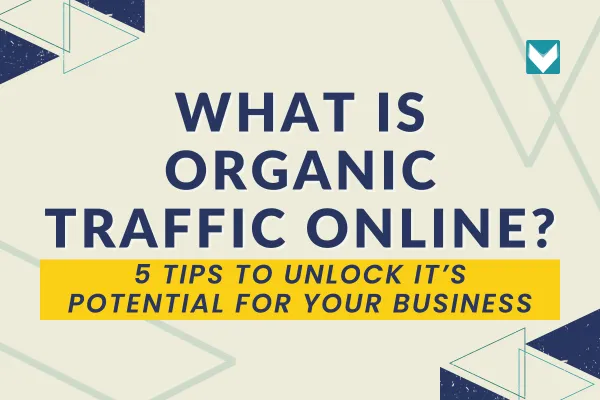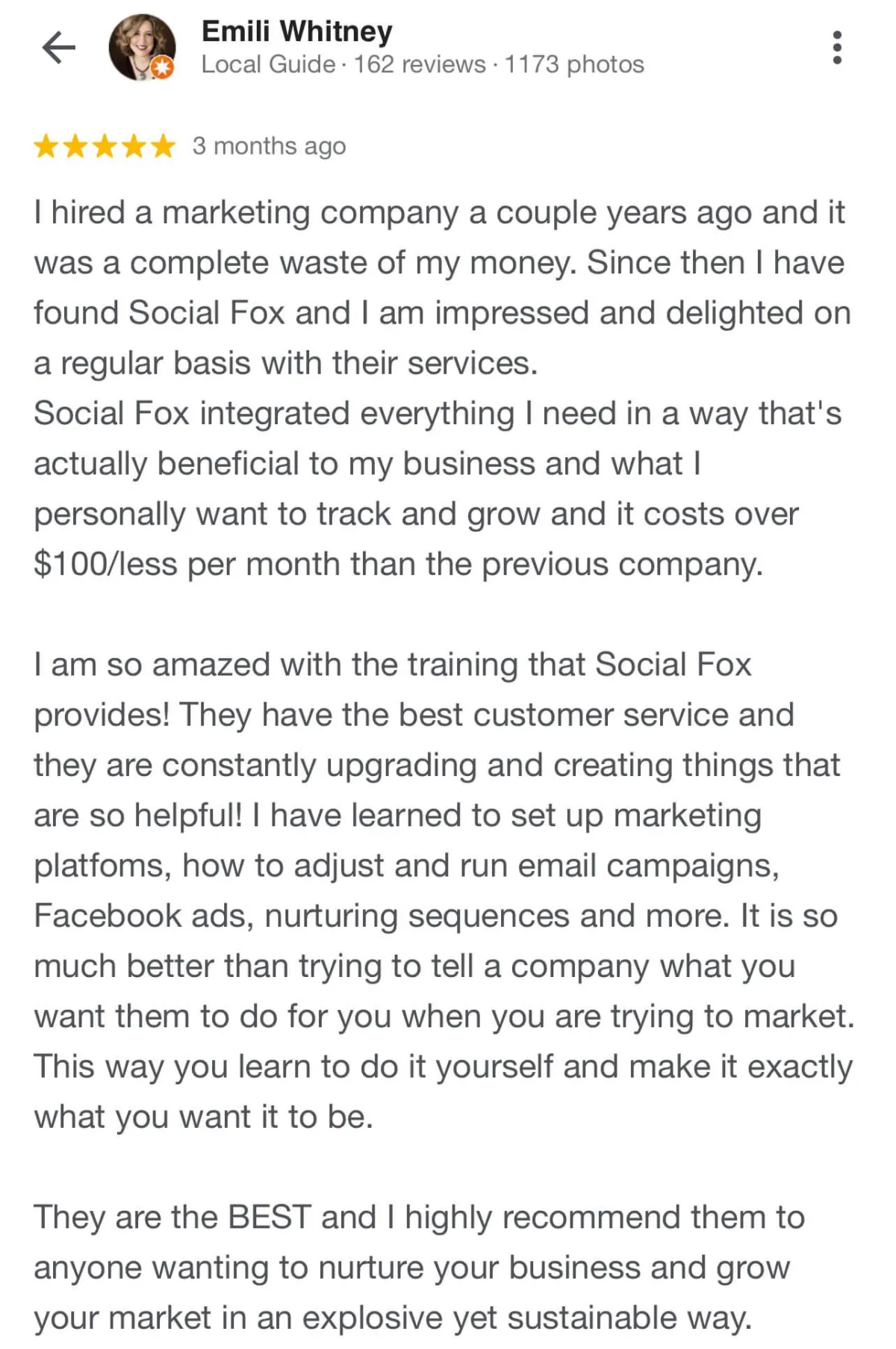

What is Organic Traffic Online? [+ 5 Tips to Unlock it’s Potential for Your Business]
What is Organic Traffic for Your Website?
In today’s digital landscape, anyone with a business and a website should have a firm understanding of online traffic sources. Understanding where your traffic is coming from helps you understand where to focus your efforts and there’s nothing better than organic traffic for sustainable online growth.
Organic traffic, or visitors who find your website through search engines without paid advertising, is a testament to your search engine optimization (SEO) and content marketing efforts. Let's expand on the organic traffic topic a bit more and explore five detailed tips to increase it.
Understanding Organic Traffic
So exactly what is organic traffic and why should you increase it? Organic traffic refers to the visitors that come to your website as a result of unpaid search results, like searching for a keyword on Google.
This is a key indicator of your website's overall health and its relevance in search engines [e.g. Google, Bing, Microsoft Edge]. Organic differs from paid traffic, which comes from advertisements, because it’s earned through effective SEO techniques and content marketing.
Different Types of Online Traffic
The types of website traffic don’t just end with paid and organic. There are several other types that are important to understand as well. Together these provide a full understanding of where your website visitors are coming from.
Paid Traffic: Visitors from paid advertising on platforms like Google AdWords, Facebook, LinkedIn, YouTube or TikTok.
Referral Traffic: Visitors who visit your site from external links either on other websites, blogs, or emails.
Direct Traffic: Visitors who type your website URL directly into their browser.
Social Traffic: Visitors coming from social media platforms like Facebook, Pinterest, or Instagram.
Organic Traffic: Visitors who find your website through search engines without being directed by paid ads.
Ideally, your website has a nice variety in traffic sources with emphasis on traffic sources that are free: referral traffic, direct traffic, social traffic, and organic traffic.
Marketing plans typically try to drive traffic to your website in a number of ways, including paid ads, but the sweet spot lies in increasing your organic traffic as this is low cost, passive, and can bring you new customers for years to come [if done correctly].
Master the art of SEO to turn searches into visits
and visits into customers.
5 Tips to Increase Organic Traffic to Your Website
There are many techniques in the online space to increase organic website traffic with one of the main techniques being improving your SEO. But what does it really mean to have great SEO for your website?
Let’s take this example: You pull up Google to search for “best small business marketing software” to get information before making a decision in your business. You’re likely shown paid ads at the very top of the page. The next websites you see have tailored their SEO for the specific keyword you searched in order to show up on the first page of your search results.
So what is organic traffic? Organic traffic is the reward for intentional effort on the front end, which then provides you with free website traffic when someone searches for a specific keyword, or one similar to it.
Now let’s get into the specifics of SEO and other ways to increase your organic website traffic.
Master SEO Basics:
Keyword Optimization: Conduct thorough keyword research to identify terms your audience is searching for. Incorporate these keywords naturally into your website’s content, titles, meta descriptions, and URLs. This ensures that search engines understand the type of content on your site.
Technical SEO: Ensure your website is mobile-friendly, has a fast loading speed, and a secure connection (HTTPS). Use tools like Google's PageSpeed Insights for performance analysis. Search engines prioritize websites that are mobile-friendly, fast, and secure.
On-Page SEO: Optimize individual web pages to rank higher. This includes using header tags (H1, H2, etc.), alt text for images, and creating a user-friendly site structure. This is the more technical aspect of SEO but pays dividends if you take the time to set your website up properly.
Create Quality Content:
Engaging and Relevant Content: If you’re curious why everyone, even large brands, have blogs on their website, this is why. Creating compelling content that addresses your audience's questions, needs, and interests helps tremendously with gaining organic traffic because it gives search engines a more accurate picture of what content topics can be found on your website. Try to use various formats like blog posts, videos, infographics, and podcasts.
Content Consistency: Regularly update your website with fresh content. A consistent schedule keeps your audience engaged and lets search engines know that your website is active.
Plan Content and Expand Your Network:
Strategic Content Planning: Take the time to develop a content strategy that aligns with your business goals and audience's search intent. Once you’ve identified your keywords, put together a content plan for content that is not only relevant but also has the potential to rank well with search engines.
Widen Your Reach: Reach out to others with a similar audience to yours and propose a guest blog post on a mutually relevant topic. By writing for a similar audience you can grow your own reach and drive more traffic to your website. This helps increase your website's credibility and improves your backlink profile (other websites sharing links to your website), which contributes to SEO.
Utilize Long-Term Traffic Strategies:
Evergreen Content: Focus on creating content that remains relevant and valuable over time so that it has the opportunity to continue bringing you organic traffic. This can include comparison posts, comprehensive guides, FAQs, and how-to articles. Essentially, you want to focus on quality over quantity.
Content Updates and Refreshes: Plan to revisit and update your older content as needed. This keeps your information current and can improve search rankings.
Monitor and Adapt:
Analytics and Tools: It’s critical to know what’s working and what isn’t on your website. Google Analytics is free and easily tracks your website’s performance. You’ll want to monitor key metrics like page views, bounce rate, and average session duration.
SEO and Content Adjustments: Based on analytics insights, continuously refine your SEO strategies and content. Identify the types of keywords that are working for you and what’s falling flat. It’s also important to know that SEO is fluid and the landscape changes so make sure you stay on top of the latest SEO trends and algorithm changes.
While intentionally building up your organic website traffic isn’t something that’s done overnight, the benefits and return on investment are huge for the long term health of your business!
Organic traffic: The key to sustainable
and cost-effective online growth.
Expanding Your Reach with Social Fox
There are many different paths to intentionally increasing organic traffic, as we’ve discussed here, but there’s benefit in increasing other traffic routes too.
By using different avenues to drive more traffic to your website, you’re actively increasing your brand visibility, amplifying your reach, and increasing engagement with your website.
These factors can all contribute directly and indirectly to improving your SEO which can drive more organic traffic to your website. Not only that, but relying on only one type of website traffic is riskier than diversifying your efforts and taking the time to build a strong brand reputation online.
If you’re racking your brain for ways to increase traffic and you’re still sleeping on email marketing for your business, don’t! It’s a great way to drive referral traffic by linking out to relevant blog posts or other pages on your website.
Starting an email list and committing to consistent communication with your audience can feel daunting at first but it gives you a great chance to try out different email styles to see what really resonates with your audience. Creating an engaging newsletter is a great place to start!
Paid ads can also increase your traffic if you’re willing to pull out your wallet, but a good alternative for paid ads is social media marketing. Producing social media content can be time consuming but, as with most things, there are ways to work smarter, not harder and get more mileage out of your content.
Grab Social Fox's Guide to Repurposing Content where we dish our best innovative ways to amplify the impact of your future and existing social media content with an omnipresent, multi-channel approach for maxed out website traffic potential.
Putting the Organic Traffic Pieces Together
Giving your website’s organic traffic a boost requires a blend of SEO expertise, quality content creation, and strategic planning. By implementing these tips and varied strategies you can easily enhance your website's visibility to attract more organic visitors. Refer back to this post whenever you need a refresher and you’ll never again need to wonder, “What is organic traffic?”!
Frequently Asked Questions (FAQs)
1. How long does it typically take to see results from organic traffic efforts?
Organic traffic growth is a long term play. With consistent effort, changes can be seen typically within a few months.
2. If organic traffic is most important, why bother with the other types?
All traffic to your website is good traffic. The more varied types of traffic you receive, the more reputable your website looks and thus increases your SEO because your website is viewed as active and providing lots of value for visitors.
3. How do I know if my organic traffic strategies are working?
Keep an eye on the number of visitors to your website, your search rankings (easily tracked with a free Google Search Console account), and the types of traffic coming to your website.
4. Can social media affect my website's organic traffic?
Absolutely! Having a strong social media presence to create more brand awareness can lead to increased direct traffic and searches.
5. Should small businesses focus on organic traffic over paid traffic?
Every small business is different but typically focusing on organic traffic strategies are more cost effective and can provide long-term consistent traffic. If you have the budget for ads as well then a combination of both is beneficial for boosting traffic and brand awareness.
© Copyright 2019 - 2026 | 🦊 Social Fox | All Rights Reserved | Privacy Policy | Terms Of Use
Let Social Fox Help You...
and ultimately be your business growth partner!

